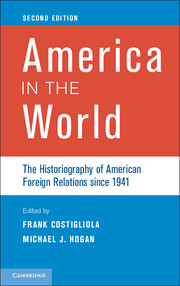Book contents
- Frontmatter
- Dedication
- Contents
- List of Contributors
- Preface
- 1 Introduction
- 2 The Charlie Maier Scare and the Historiography of American Foreign Relations, 1959–1980
- 3 Chaps Having Flaps: The Historiography of U.S. Foreign Relations, 1980–1995
- 4 Still Contested and Colonized Ground: Post–Cold War Interpretations of U.S. Foreign Relations during World War II
- 5 Recent Literature on Truman’s Atomic Bomb Decision
- 6 The Cold War
- 7 Cold War Presidents: Dwight D. Eisenhower, John F. Kennedy, Lyndon Baines Johnson, and Richard M. Nixon
- 8 The War that Never Ends: Historians and the Vietnam War
- 9 Culture and the Cold War: U.S.–Latin American Historiography since 1995
- 10 Impatient Crusaders: The Making of America’s Informal Empire in the Middle East
- 11 Explaining the Rise to Global Power
- 12 Bringing the Non-State Back In
- 13 Technology and the Environment in the Global Economy
- 14 U.S. Mass Consumerism in Transnational Perspective
- 15 A Worldly Tale
- Index
- References
7 - Cold War Presidents: Dwight D. Eisenhower, John F. Kennedy, Lyndon Baines Johnson, and Richard M. Nixon
The New Scholarly Literature
Published online by Cambridge University Press: 05 June 2014
- Frontmatter
- Dedication
- Contents
- List of Contributors
- Preface
- 1 Introduction
- 2 The Charlie Maier Scare and the Historiography of American Foreign Relations, 1959–1980
- 3 Chaps Having Flaps: The Historiography of U.S. Foreign Relations, 1980–1995
- 4 Still Contested and Colonized Ground: Post–Cold War Interpretations of U.S. Foreign Relations during World War II
- 5 Recent Literature on Truman’s Atomic Bomb Decision
- 6 The Cold War
- 7 Cold War Presidents: Dwight D. Eisenhower, John F. Kennedy, Lyndon Baines Johnson, and Richard M. Nixon
- 8 The War that Never Ends: Historians and the Vietnam War
- 9 Culture and the Cold War: U.S.–Latin American Historiography since 1995
- 10 Impatient Crusaders: The Making of America’s Informal Empire in the Middle East
- 11 Explaining the Rise to Global Power
- 12 Bringing the Non-State Back In
- 13 Technology and the Environment in the Global Economy
- 14 U.S. Mass Consumerism in Transnational Perspective
- 15 A Worldly Tale
- Index
- References
Summary
INTRODUCTION
Analyzing the historical literature on the foreign policies of the presidencies of Dwight D. Eisenhower, John F. Kennedy, Lyndon Baines Johnson, and Richard M. Nixon poses logistical and interpretive challenges. In the first edition of America in the World (1995), my essay on Eisenhower included eighty-eight footnotes and cited approximately 250 articles and books. Chester Pach, author of an incisive history of the Eisenhower administration, listed 840 sources on Eisenhower in the masterful bibliographic guide American Foreign Relations since 1600 (2003), edited by Robert L. Beisner. Robert D. Schulzinger’s subsequent chapters on the “Kennedy-Johnson Era” and “Nixon-Kissinger Era” listed 419 and 266 sources respectively. But to examine thoroughly the scholarly literature on a presidential administration, it would also be necessary to consult studies on U.S. relations with Asia, Africa, the Middle East, and Latin America. For example, the United States was militarily engaged in Vietnam during the four presidencies under review. Schulzinger compiled a chapter on Vietnam with 620 citations for the Beisner bibliographic guide. The scholarly literature has grown exponentially, especially as it pertains to the Johnson and Nixon presidencies. Scholars increasingly have access to newly declassified materials like the 10,000 recorded telephone conversations of President Johnson and the more than 15,000 transcribed telephone conversations of Henry L. Kissinger, President Nixon’s national security advisor and secretary of state.
- Type
- Chapter
- Information
- America in the WorldThe Historiography of American Foreign Relations since 1941, pp. 131 - 166Publisher: Cambridge University PressPrint publication year: 2013

